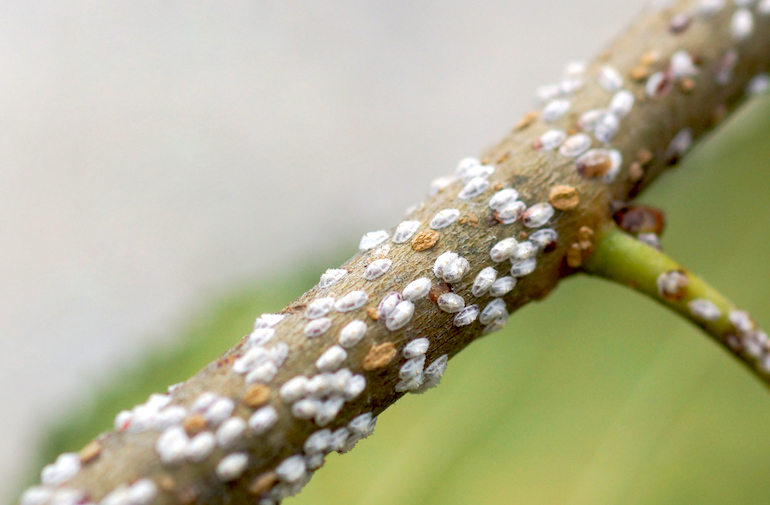With their nasty habit of sucking the sap of plants with their rostrum, these small parasitic insects are a bit like vampires! As long as the weather is warm, they can be found everywhere: succulents, cacti, ornamental shrubs, roses, fruit trees (apple, citrus), orchids… And in houseplants, they are present all year round. However, once these pests are there, it is better to act quickly, because they are not easy to dislodge.
Observation is therefore a key element to unmask them as soon as they arrive and could be followed by quarantine to avoid spreading! It is also necessary to prune the trees, remove dead branches as well as the infested pieces that you must burn. But above all, when the invasion of harmful mealybugs is declared, do not hesitate to concoct this very effective super mixture. When sprayed, it will help the gardener in his biological fight against mealy bug infestations.
Contents
Scale insects can be a common problem for plants, and getting rid of them can be challenging. Here are steps to effectively control and eliminate scale insects:
- Identification: First, identify the type of scale insect you’re dealing with. There are two main types: soft scales and armored scales. Knowing the specific species will help you choose the most effective control method.
- Pruning: Prune and remove heavily infested branches or plant parts. This can help reduce the scale population and prevent further spread.
- Natural Predators: Encourage natural predators like ladybugs, lacewings, and parasitic wasps, which feed on scale insects. Planting a diverse garden with nectar-rich flowers can attract beneficial insects.
- Horticultural Oil Spray: Apply horticultural oil during the dormant season (usually late winter or early spring) to suffocate scale insects. Be sure to follow the manufacturer’s instructions for proper dilution and application.
- Neem Oil: Neem oil is an organic option that can be effective against scale insects. Mix neem oil with water and a small amount of dish soap and spray it on the affected plants. Neem oil can disrupt the feeding and reproduction of scales.
- Insecticidal Soap: Insecticidal soap is another organic option that can be sprayed directly on the scale insects to disrupt their outer protective coating. Follow the product instructions carefully.
- Systemic Insecticides: If the infestation is severe and other methods have failed, consider using a systemic insecticide. These are absorbed by the plant and kill the scales when they feed on plant sap. Be cautious when using chemicals and follow label instructions.
- Scrubbing: For light infestations on houseplants, you can gently scrub the scale insects off with a soft brush or cloth dipped in soapy water. Be sure to rinse the plant thoroughly after scrubbing.
- Maintain Plant Health: Healthy plants are better able to resist and recover from scale infestations. Provide proper watering, nutrition, and care to your plants.
- Isolation: Isolate infested plants to prevent the spread of scale insects to healthy plants.
- Regular Inspection: Continue to monitor your plants for scale insects and take action as soon as you detect an infestation. Early intervention can prevent a minor problem from becoming a major one.
Remember that controlling scale insects may require persistence and multiple treatments over time. It’s also essential to address the underlying causes, such as plant stress or poor growing conditions, to prevent future infestations. Integrated pest management (IPM) practices, including using beneficial insects and maintaining a healthy garden ecosystem, can help in long-term scale insect control.
What you need:
-One teaspoon of liquid black soap
-Then another teaspoon of alcohol at 90
-And finally a teaspoon of soybean oil (or other vegetable oil like rapeseed oil)
-Spray bottle
Steps:
1) You need to dilute your black soap, alcohol and soybean oil in a liter of water and mix well. You can do this directly in your spray bottle. Your insecticide is already ready to use.
2) Put a plastic film on the surface of the jar to avoid getting product in the soil.
3) Spray your treatment solution on the leaves, both above and below. These bugs tend to hide under the leaves, so don’t leave out any nooks and crannies! Then, repeat the spraying an hour later on the host plants.
4) Do this once a week for two months. The infestation and proliferation of this parasitic insect pest will no longer be a problem on your indoor or outdoor plants (orchids, cacti, trees and shrubs, certain ornamental species, etc.).
Alternative techniques against scale insects :

This mixture is highly effective, but if you don’t feel like buying these natural ingredients, there are other methods.
-Up to three times a week, treat attacked plants with a product made of one and a half liters of water and 150 ml of black soap (natural insecticide). This soapy water spray can also be effective against aphids and other predators for your green plants. You can also make a spray of nettle manure.
-Also, you can make a more concentrated mixture of water and black soap to sponge on the plant.
-Soak a cotton swab with methylated spirits or white vinegar and dab the scale. Household alcohol or rubbing alcohol will remove the shells. However, do not pour it on the roots or the soil!
In addition, a few maintenance measures can help against mealybugs. First of all, as explained earlier, you will need to do some pruning, as unpruned trees attract them. Also, scrape the soil under the trees and plants, because mealybugs and their larvae find refuge there during the cold seasons while waiting for the summer. Finally, several species of ladybugs and hymenopterans are its natural enemies and allow to fight against the mealy bug and eradicate it. As you can see, there is no need for insecticides or traps based on chemical products from garden centers to save infested plants.


